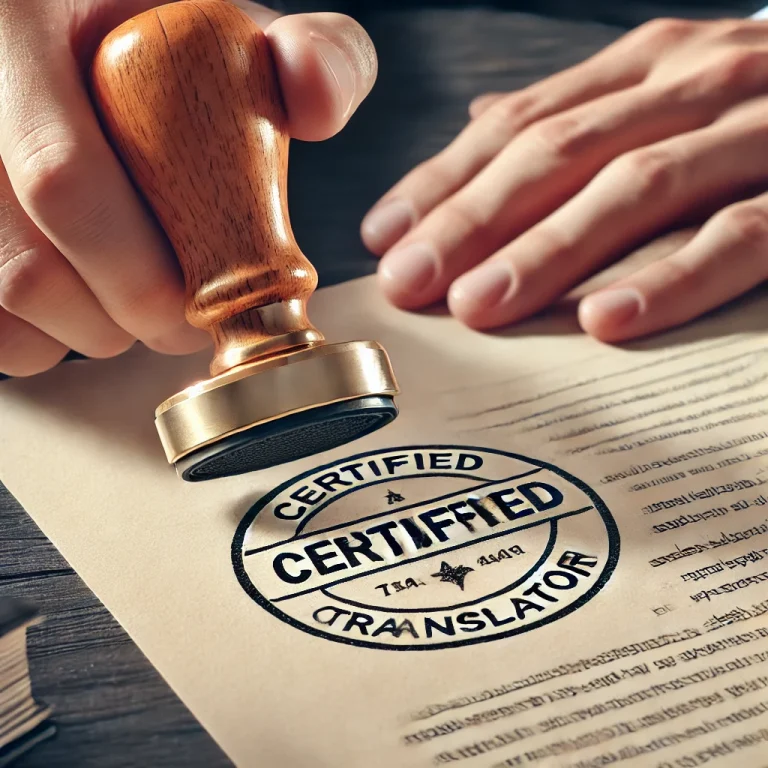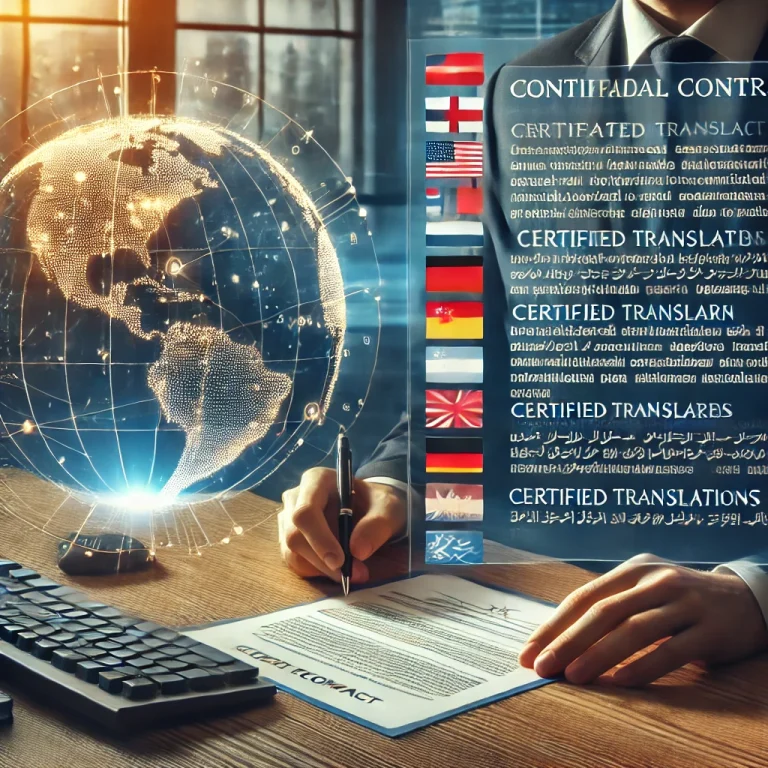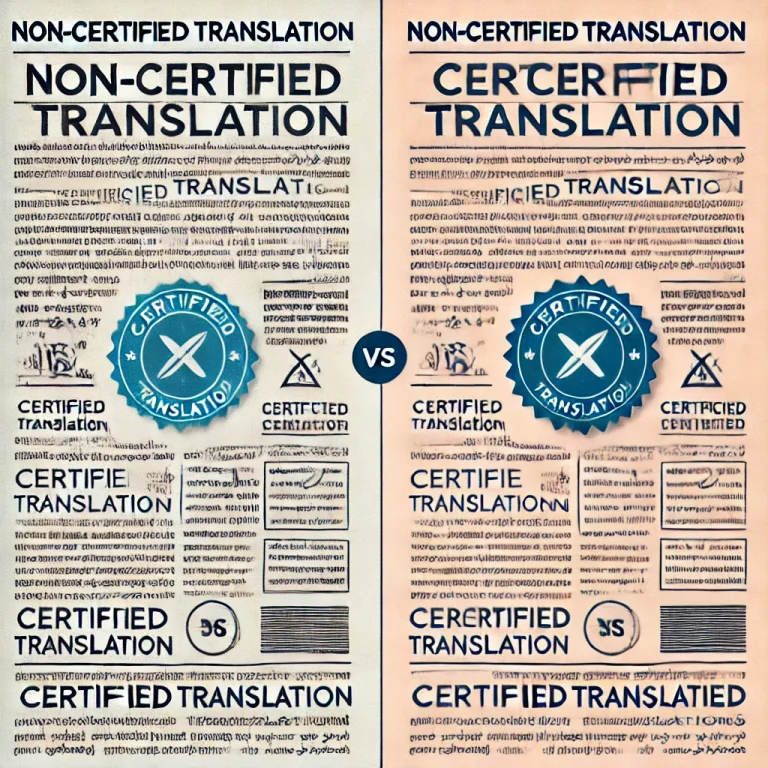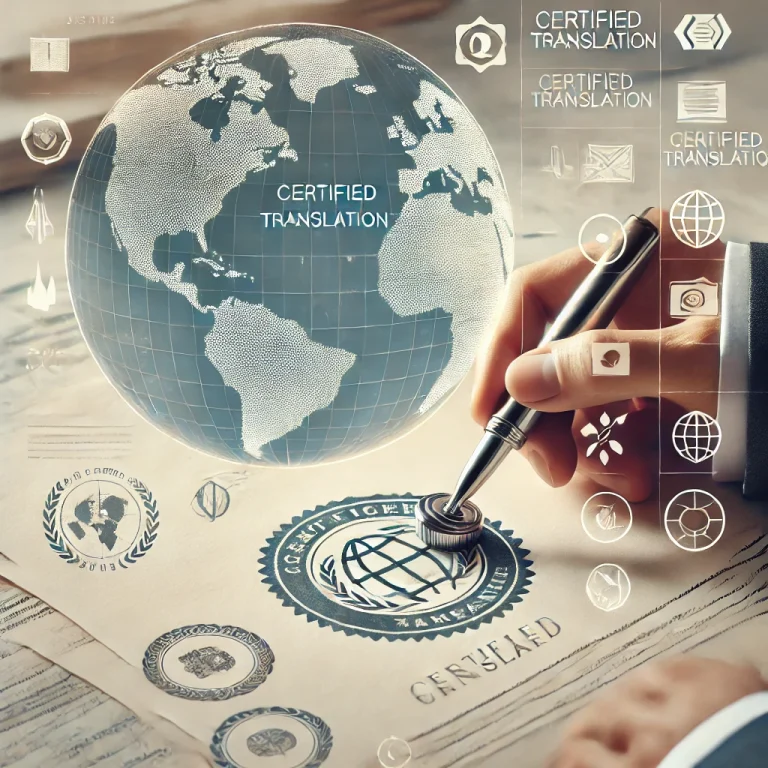In this increasingly interconnected world, the ability to communicate effectively across borders has become essential for businesses looking to tap into global markets. That’s where certified translation comes in. With the power to bridge language barriers and unlock global opportunities, certified translation is a game-changer for businesses of all sizes.
Certified translation not only ensures accurate and culturally appropriate translations but also provides legal certification of the translated document’s authenticity. Whether it’s translating legal contracts, marketing materials, or medical documents, partnering with certified translation services guarantees professionalism, accuracy, and compliance with legal requirements.
By investing in certified translation, businesses can expand their reach and tap into new markets with confidence. It not only helps build trust with international audiences but also enhances brand reputation and credibility. Moreover, certified translation enables businesses to comply with local regulations and overcome language barriers that can hinder growth and expansion.
Unlocking global opportunities requires effective communication, and certified translation can be the key to success in the international marketplace. Don’t let language limit your growth potential. Invest in certified translation and open up a world of possibilities for your business.
Understanding certified translation
Certified translation is a specialized service that ensures the accuracy, authenticity, and legal validity of translated documents. When a document is certified, it means that a professional translator, who is often accredited or certified by a recognized governing body, has meticulously translated the content from one language to another. This process involves not only linguistic expertise but also a deep understanding of the cultural nuances and legal requirements associated with the document.
The certified translation process typically includes several steps, such as a thorough review of the source document, research into any specialized terminology, and a final proofreading to ensure the translated version is a precise and faithful representation of the original. The translator may also provide a certification statement, which attests to the accuracy of the translation and the translator’s qualifications.
Certified translations are often required for legal, financial, or official purposes, where the authenticity and validity of the document are of utmost importance. These can include immigration documents, academic transcripts, birth certificates, contracts, and a wide range of other official paperwork. By obtaining a certified translation, businesses and individuals can ensure that their documents are recognized and accepted by the relevant authorities, both domestically and internationally. Read more about our services.

Why certified translation is important for businesses
In today’s globalized economy, businesses of all sizes are seeking to expand their reach and tap into new markets. However, navigating the challenges of language barriers and cultural differences can be a significant obstacle to success. This is where certified translation becomes a critical tool for businesses looking to succeed in the international marketplace.
Accurate and reliable translation is essential for businesses to effectively communicate with their global partners, customers, and stakeholders. Certified translation ensures that the translated content accurately conveys the intended meaning, tone, and nuance of the original document. This level of precision is crucial for maintaining professional relationships, negotiating contracts, and ensuring compliance with local regulations.
Moreover, certified translation can enhance a business’s credibility and trustworthiness in the eyes of international audiences. When clients or partners see that a business has invested in professional, certified translation services, it demonstrates a commitment to quality, attention to detail, and a willingness to adapt to local customs and requirements. This can be a significant competitive advantage, particularly in industries where regulatory compliance and attention to detail are paramount.
Ultimately, certified translation is a strategic investment that can unlock global opportunities for businesses of all sizes. By bridging language barriers and ensuring the accurate representation of critical documents, certified translation can help businesses expand their reach, build stronger international relationships, and position themselves for long-term success in the global marketplace. Understanding the Value of Certificate Translation.

The role of certified translation in global opportunities
As businesses seek to expand their operations and tap into new markets around the world, the ability to communicate effectively across languages and cultures becomes increasingly crucial. Certified translation plays a vital role in unlocking these global opportunities by providing businesses with the tools they need to navigate the complexities of international expansion.
One of the primary ways certified translation facilitates global opportunities is by ensuring compliance with local regulations and legal requirements. Many countries have specific language and documentation requirements for various business transactions, such as contract signings, patent filings, or regulatory approvals. Certified translation helps businesses meet these requirements by providing legally-binding translations that are recognized and accepted by the relevant authorities.
Furthermore, certified translation can help businesses build trust and credibility with international partners, clients, and customers. When a business presents documents that have been professionally and accurately translated, it demonstrates a commitment to quality, attention to detail, and a respect for cultural nuances. This can be a significant advantage in industries where building strong, long-term relationships is key to success.
Beyond the practical and legal benefits, certified translation can also open up new avenues for growth and innovation. By accessing international markets, businesses can diversify their customer base, explore new product or service offerings, and gain valuable insights into global trends and best practices. This cross-pollination of ideas and perspectives can lead to the development of innovative solutions that can be applied both domestically and internationally.
In short, certified translation is a powerful tool that enables businesses to navigate the complexities of the global marketplace and unlock a wealth of opportunities for growth, expansion, and success. By investing in certified translation services, businesses can overcome language barriers, comply with local regulations, and build strong, lasting relationships with international partners and customers. An authoritative website such as the American Translators Association (ATA) that discusses certification standards for translators.

Certified translation vs. non-certified translation
When it comes to translating critical business documents, the distinction between certified and non-certified translation can be a crucial factor in determining the success and legality of the process. While both types of translation services aim to convert content from one language to another, there are significant differences in terms of quality, legal validity, and the level of expertise involved.
Certified translation is performed by professional, accredited translators who adhere to strict standards and guidelines. These translators are often certified by recognized governing bodies, such as the American Translators Association (ATA) or the International Federation of Translators (FIT), and they have a deep understanding of the cultural nuances and legal requirements associated with the documents they translate. The certified translation process typically includes multiple rounds of review, proofreading, and quality assurance to ensure the highest level of accuracy and authenticity.
In contrast, non-certified translation can be carried out by a wide range of individuals, from amateur language enthusiasts to freelance translators without formal training or accreditation. While these services may be more cost-effective in the short term, they often lack the rigorous quality control and legal validation that are hallmarks of certified translation. Non-certified translations may contain errors, inconsistencies, or cultural misunderstandings that can have serious consequences, particularly in legal or official contexts.
The legal implications of using certified vs. non-certified translation are also a crucial consideration. Certified translations are often required for official documents, such as immigration paperwork, academic transcripts, or legal contracts, as they provide a legally-binding guarantee of the document’s authenticity and accuracy. Non-certified translations, on the other hand, may not be accepted by authorities or institutions, potentially leading to delays, complications, or even the rejection of the document.
When it comes to ensuring the integrity and compliance of critical business documents, the choice between certified and non-certified translation is clear. Investing in certified translation services may require a slightly higher upfront cost, but it can pay dividends in the long run by protecting the business from legal risks, enhancing its credibility, and unlocking valuable global opportunities. A Guide to Legal Translation Services. ISO 17100: Translation Services, the international standard for translation services, explaining the importance of certified translations.

How to find certified translation services
Navigating the world of certified translation services can be a daunting task, especially for businesses that are new to the process. However, with a little research and due diligence, it’s possible to find reliable, high-quality certified translation providers that can meet your specific needs.
One of the first steps in finding a certified translation service is to identify your specific requirements. Consider the types of documents you need to translate, the target languages, the turnaround time, and any special formatting or certification requirements. This information will help you narrow down your search and ensure that you find a service provider that can meet your needs.
Next, look for certified translation providers that are accredited by recognized industry organizations, such as the American Translators Association (ATA) or the International Federation of Translators (FIT). These organizations maintain rigorous standards for their members and can provide valuable insights into the qualifications and expertise of different translation service providers.
Another effective way to find a reliable certified translation service is to ask for referrals from other businesses in your industry or network. Word-of-mouth recommendations can be a valuable source of information, as they provide firsthand insights into the quality of a provider’s services, their responsiveness, and their overall customer satisfaction.
When evaluating potential certified translation service providers, be sure to review their credentials, sample work, and client testimonials. Look for providers that have experience in your specific industry or with the types of documents you need to translate. Additionally, consider factors such as turnaround time, pricing, and the availability of additional services, such as proofreading or formatting assistance.
Finally, don’t be afraid to ask questions and request a consultation with the translation service provider. A reputable and transparent provider should be willing to walk you through their process, answer any questions you may have, and provide a clear understanding of the services they offer and the associated costs.
By following these steps, you can identify and partner with a certified translation service that will ensure the accuracy, authenticity, and legal compliance of your critical business documents, ultimately unlocking new global opportunities for your organization.

The benefits of using certified translation services
Investing in certified translation services can provide a wealth of benefits for businesses looking to expand their global reach and tap into new markets. From ensuring legal compliance to enhancing brand credibility, the advantages of certified translation are numerous and far-reaching.
One of the primary benefits of certified translation is the guarantee of accuracy and authenticity. Certified translators are highly skilled professionals who undergo rigorous training and certification processes to ensure they can deliver translations that are true to the original content. This level of precision is essential for legal, financial, or official documents, where even minor errors can have significant consequences.
Certified translation also provides businesses with the assurance of legal validity. Many countries and institutions require that certain documents, such as contracts, patents, or academic transcripts, be accompanied by a certified translation that is recognized and accepted by the relevant authorities. By using certified translation services, businesses can ensure that their critical documents are in compliance with local regulations and can be seamlessly integrated into international processes.
Another key benefit of certified translation is the enhancement of brand credibility and trustworthiness. When businesses present their materials in multiple languages, using certified translation services demonstrates a commitment to quality, attention to detail, and a respect for cultural nuances. This can be a powerful differentiator in highly competitive global markets, where the ability to communicate effectively and build strong relationships is crucial to success.
Certified translation can also unlock new opportunities for businesses by enabling them to access previously untapped markets. By removing language barriers and ensuring the accurate representation of their products, services, or offerings, businesses can expand their customer base, explore new revenue streams, and gain valuable insights into global trends and best practices.
Finally, certified translation can provide businesses with a level of protection against legal and reputational risks. In the event of a dispute or legal challenge, the use of certified translations can serve as a reliable and legally-binding record of the original content, helping to mitigate the potential for costly litigation or damage to the business’s reputation.
In short, the benefits of using certified translation services are numerous and far-reaching. By investing in this strategic resource, businesses can enhance their global competitiveness, ensure legal compliance, build stronger international relationships, and ultimately unlock a world of new opportunities for growth and success.
Examples of industries that benefit from certified translation
Certified translation services are invaluable across a wide range of industries, each with its own unique set of requirements and challenges. From legal and financial sectors to healthcare and technology, the need for accurate, legally-binding translations is a common thread that binds these diverse industries together.
In the legal industry, certified translation is essential for the translation of contracts, patents, court documents, and other critical legal paperwork. Ensuring the precise and legally-valid translation of these documents is crucial for maintaining compliance, avoiding costly disputes, and protecting the interests of clients and stakeholders.
The financial sector is another industry that heavily relies on certified translation services. From banking and investment documents to financial reports and regulatory filings, the ability to accurately translate complex financial information is crucial for maintaining compliance, building trust with international clients, and facilitating cross-border transactions.
In the healthcare industry, certified translation plays a vital role in ensuring the accurate and culturally-appropriate translation of medical records, patient consent forms, and pharmaceutical labeling. Inaccurate translations in this sector can have serious consequences, making certified translation a non-negotiable requirement for healthcare organizations operating in global markets.
The technology industry is also a prime beneficiary of certified translation services. As tech companies seek to expand their reach and tap into new markets, the ability to accurately translate software interfaces, user manuals, and marketing materials becomes increasingly important. Certified translation helps these businesses communicate effectively with international customers and maintain compliance with local regulations.
Beyond these well-known industries, certified translation services are also essential for a wide range of other sectors, including education, manufacturing, logistics, and government. In each of these industries, the ability to accurately translate critical documents and communications can mean the difference between success and failure in the global marketplace.
Regardless of the industry, the common thread that binds these diverse organizations together is the need for certified translation services that can provide the accuracy, authenticity, and legal validity required to navigate the complexities of the global business landscape. By investing in certified translation, businesses can unlock a world of new opportunities and position themselves for long-term success in the international marketplace.
The process of getting a document certified translated
The process of getting a document certified translated can vary slightly depending on the specific requirements of the organization or institution that requires the certified translation. However, there are some common steps that businesses and individuals can expect to follow when seeking certified translation services.
The first step in the process is to identify the document that requires certification and the target language for the translation. This information will be crucial in selecting the appropriate certified translation service provider and ensuring that the final product meets the necessary requirements.
Once the document and target language have been identified, the next step is to locate a reputable certified translation service provider. This can involve researching accredited translators or translation agencies, checking their credentials and references, and evaluating their experience in the specific industry or document type that requires translation.
After selecting a certified translation service provider, the client will typically be required to submit the original document, along with any relevant instructions or specifications. The certified translator will then carefully review the source material, conduct any necessary research or terminology verification, and proceed with the translation process.
During the translation process, the certified translator will adhere to strict quality control measures to ensure the accuracy and authenticity of the final product. This may include multiple rounds of proofreading, editing, and verification to ensure that the translated document is a true and accurate representation of the original.
Once the translation is complete, the certified translator will provide the client with the translated document, along with a certification statement. This statement attests to the translator’s qualifications, the accuracy of the translation, and the legal validity of the document. Depending on the requirements, the certification statement may be attached directly to the translated document or provided as a separate document.
In some cases, the certified translation may need to be further authenticated or legalized, particularly for use in legal or official contexts. This may involve additional steps, such as notarization or apostille, to ensure the document’s acceptance by the relevant authorities.
By following this process and partnering with a reputable certified translation service provider, businesses and individuals can ensure that their critical documents are accurately and legally translated, enabling them to navigate the complexities of the global marketplace with confidence and ease. Certified Translation for Legal Documents.
Tips for ensuring accurate and high-quality certified translations
Ensuring the accuracy and high-quality of certified translations is essential for businesses seeking to expand their global reach and unlock new opportunities. While certified translation services provide a level of assurance and legal validity, there are still several steps businesses can take to maximize the quality and effectiveness of their translated documents.
One of the most important tips is to work with a certified translation service provider that has experience and expertise in your specific industry or document type. Different sectors, such as legal, medical, or technical, often have unique terminology, formatting, and cultural nuances that require specialized knowledge. By partnering with a provider that understands these industry-specific requirements, businesses can be confident that their translations will be accurate, culturally appropriate, and legally compliant.
Another key tip is to provide the translation service provider with as much context and background information as possible. This can include detailed instructions, reference materials, or even the original document’s formatting and layout. The more information the translator has access to, the better they can understand the intended meaning and ensure that the translated version accurately reflects the original content.
It’s also important to establish clear communication and feedback channels with the translation service provider. This allows businesses to review the translated documents, provide feedback, and address any concerns or issues that may arise during the translation process. By maintaining an open dialogue, businesses can work closely with the provider to refine the translations and ensure they meet their specific needs.
In addition to working closely with the translation service provider, businesses should also consider incorporating quality assurance measures into their own review process. This may involve having the translated documents reviewed by internal subject matter experts or independent proofreaders to catch any errors or inconsistencies before the final version is approved.
Finally, businesses should be mindful of the importance of maintaining consistent terminology and branding across their translated materials. By establishing glossaries, style guides, and other resources, businesses can ensure that their brand identity and messaging remain cohesive and recognizable, even as they expand into new global markets.
By following these tips and working closely with a trusted certified translation service provider, businesses can ensure that their critical documents are accurately and effectively translated, enabling them to unlock a world of new opportunities and succeed in the global marketplace.
FAQs: Certified Translation
What is certified translation?
Certified translation refers to the process of translating a document and providing a certification statement that confirms the translation is accurate and complete. The translation is typically performed by a qualified translator who is certified by a recognized body. Certified translations are often required for official documents such as legal contracts, birth certificates, immigration papers, and academic transcripts.
When do I need certified translation services?
You’ll need certified translation services when dealing with legal or official documents that must be accepted by courts, government agencies, or international organizations. This includes documents like immigration paperwork, legal contracts, financial statements, patents, and diplomas. Certified translation ensures the document is legally valid and recognized by the relevant authorities.
How does certified translation differ from non-certified translation?
Certified translation involves a professional, accredited translator who provides a signed certificate verifying the accuracy and completeness of the translation. This type of translation is legally binding and is often required for legal, medical, or official purposes. Non-certified translation, on the other hand, may not have legal validity and is typically used for informal or internal purposes where certification is not needed.
Why is certified translation important for businesses?
Certified translation is crucial for businesses operating internationally, as it ensures the legal and linguistic accuracy of critical documents such as contracts, patents, and compliance paperwork. It helps businesses meet local regulations, build trust with global partners, and avoid costly legal disputes. Moreover, certified translation enhances a business’s credibility in foreign markets, showing a commitment to professionalism and cultural awareness.
How can I find a reliable certified translation service provider?
To find a reliable certified translation service provider, look for agencies accredited by recognized organizations such as the American Translators Association (ATA) or International Federation of Translators (FIT). Research the provider’s credentials, client reviews, and industry experience. It’s also important to ask for sample work, check their quality assurance process, and ensure they offer specialized services for your specific industry or document type.
What industries benefit most from certified translation services?
Certified translation services are especially valuable in industries where accuracy, legal compliance, and precision are critical. These include the legal industry (for contracts, court documents, and patents), financial services (for banking, investment, and regulatory filings), healthcare (for medical records, consent forms, and pharmaceutical labeling), and the technology sector (for software localization, manuals, and marketing materials). Other sectors like education, government, and manufacturing also benefit from certified translation.
What is the process of obtaining a certified translation?
The process of obtaining a certified translation typically involves selecting a reputable translation provider, submitting your document for review, and working closely with the translator. The translator will perform a detailed translation, verify any legal or specialized terminology, and provide a certification statement attesting to the accuracy and completeness of the translation. In some cases, further notarization or legalization (such as an apostille) may be required depending on the document’s destination.
Conclusion: Leveraging the power of certified translation for global success
In today’s interconnected world, the ability to communicate effectively across languages and cultures has become a critical success factor for businesses seeking to expand their global reach. Certified translation services play a pivotal role in unlocking these global opportunities, providing businesses with the tools and expertise they need to navigate the complexities of the international marketplace.
By investing in certified translation, businesses can ensure the accuracy, authenticity, and legal validity of their critical documents, from contracts and patents to marketing materials and regulatory filings. This level of precision and compliance is essential for building trust with international partners, clients, and stakeholders, and for maintaining a strong, credible brand presence in global markets.
Moreover, certified translation can open up a world of new possibilities for businesses, enabling them to access previously untapped markets, diversify their customer base, and explore innovative solutions that can be applied both domestically and internationally. By overcoming language barriers and cultural differences, certified translation empowers businesses to communicate effectively, build stronger relationships.


